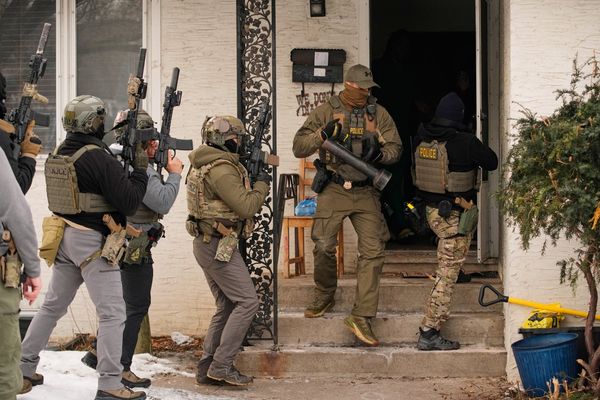
When Nasera Rane visits her son’s grave – something she does several times a week – she sits on a deck chair plastered with a pithy quote: “Death leaves a heartache no one can heal, love leaves a memory no one can steal.”
“Being in this situation is extremely difficult. We don’t know how to survive, waking up every day and facing the reality again,” Rane says.
Rane said her 24-year-old son, Mohamad Ikraam Bahram, was diagnosed with schizophrenia in 2017. She feels strongly that if he had appropriate mental health support, he would still be alive today.
She said Bahram had been suffering a severe mental health episode when he stabbed a tourist with a knife in Brisbane in February 2020.
The tourist was taken to hospital with minor injuries, but the incident cost Bahram his life after he reportedly charged towards police with the weapon. Rane said police fired up to 15 rounds that day, with 10 landing into his body.

A pre-inquest conference will be held on Monday, ahead of a coronial inquiry – expected later this year – that will look into the circumstances leading up to the shooting, including the mental health treatment Bahram received.
It will also examine whether police actions were appropriate and whether the training provided to officers is sufficient.
Rane said her son’s mental health had deteriorated in the months leading up to the shooting, with him ending up in hospital two months prior.
“It was so real to him. We could not say anything. He was hiding himself in the car thinking the police was waiting outside to shoot him,” she said.
Before Bahram was hospitalised, she was concerned her son had been forgoing medication.
She said when Bahram was discharged after four days in hospital on 24 December, he was not prescribed any regular psychotic medication and was unable to see a psychiatrist until 7 February.
“It probably takes about four to six weeks for the medication to work,” Rane said. “And then after one bad mental health episode, he took off and went into the city.”
Queensland Health has been contacted for comment.
In February 2020, the state’s health minister, Steven Miles, said the care provided to Bahram by Queensland Health would be investigated.
“Mental health issues are very complex and what we can do as a health service is ensure we have the resources and staffing to support people and we are doing that,” Miles said at the time.
Rita Jabri Markwell, a lawyer for Australian Muslim Advocacy Network, says the case also highlights issues with how police interact with Muslims who have mental health conditions.
Bahram’s mother called the police in 2016 after her son reportedly got aggressive with his roommate.
After Bahram was visited by Queensland police officers, he received a visit from an Australian Federal Police (AFP) community liaison officer who spoke with him about his religious beliefs.
It remains unclear as to why AFP visited Bahram, however, his family believes the community liaison officer came away from that meeting concluding that he posed no terrorism risk.
The AFP and the Queensland police service say it is not appropriate to comment as the matter is subject to an ongoing coronial inquiry.
But Jabri Markwell, who has been in constant contact with Bahram’s family over the years, said the interaction sent him spiralling and planted a seed in his head.
“He told his mother, you’ve opened up a can of worms here,” Jabri Markwell said. “He felt paranoid that he was on some sort of watch list.”

Jabri Markwell said there is a culture within police to see Muslim troubled youth or those experiencing mental illness through the prism of a possible terrorism risk.
“Muslim young men are already feeling under that eye that watchful eye,” Jabri Markwell said.
“We should be trying to reduce the amount of police engagement and increase the amount of mental health engagement.”
Rane said the situation obviously gets worse “when you don’t have mental health support”.
“Ikraam was a very kind and caring person.”
Crisis support services can be reached 24 hours a day: Lifeline 13 11 14; Suicide Call Back Service 1300 659 467; Kids Helpline 1800 55 1800; MensLine Australia 1300 78 99 78; Beyond Blue 1300 22 4636







